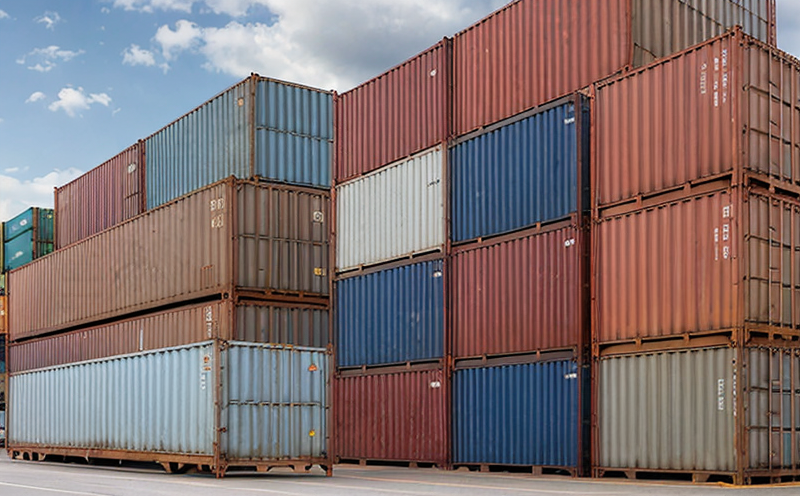EN 1935 Mechanical Testing of Export Hardware Products
The EN 1935 standard specifies mechanical testing procedures for hardware products intended for export. This regulation ensures that exported hardware meets the robustness and durability requirements set by the destination country, thereby protecting both the manufacturer's reputation and end-user safety.
EN 1935 covers a wide range of hardware components including bolts, nuts, screws, washers, and other fasteners. The mechanical tests are critical in ensuring that these products can withstand the stresses they will encounter during transport and installation without failure.
The testing procedures outlined in EN 1935 include tensile strength testing, bending tests, hardness tests, and impact resistance tests. These tests help to ensure that the hardware components not only meet the mechanical performance criteria but also comply with international safety standards.
For instance, tensile strength tests are conducted by attaching a specimen of the hardware component to a machine that pulls it apart until failure occurs. The maximum load applied before failure is recorded as the tensile strength. Similarly, bending tests involve applying a force perpendicular to the axis of the material to measure its flexibility and resistance.
Hardness testing determines how resistant the material is to indentation from a hard object. This test is crucial for ensuring that the hardware can withstand wear and tear during prolonged use. Impact resistance tests, on the other hand, assess the ability of the component to absorb impact energy without fracturing or deforming excessively.
Specimen preparation is a critical step in mechanical testing. Depending on the type of hardware being tested, the specimen may need to be machined from raw stock material to ensure uniformity and consistency with real-world components. The specimens are then cleaned and inspected for defects before undergoing the specified tests.
The instrumentation used for these tests includes hydraulic tensile testers, universal testing machines, hardness testers, and impact strength testers. These instruments provide precise measurements that help in accurately assessing the mechanical properties of the hardware products.
Reporting the results of these tests is also an essential part of the process. The report typically includes detailed descriptions of the test procedures followed, the specimens used, the equipment employed, and the results obtained. It also provides recommendations for any necessary adjustments to improve the mechanical performance of the hardware components if they do not meet the required standards.
International Acceptance and Recognition
- Global Standards Compliance: The EN 1935 standard is widely recognized in Europe, but its compliance also opens doors to global markets. Exporting hardware that meets this standard ensures compatibility with international regulatory requirements.
- Market Access: By adhering to EN 1935, manufacturers can ensure their products are accepted by importers and buyers across the globe, thus facilitating smoother trade processes.
The standard is recognized in numerous countries around the world due to its rigorous testing protocols. Compliance with this regulation not only ensures that exported hardware meets stringent quality standards but also demonstrates a commitment to safety and reliability, which are highly valued by international buyers.
Eurolab Advantages
At Eurolab, we pride ourselves on providing comprehensive testing services that go beyond compliance. Our team of experts ensures that every aspect of the EN 1935 mechanical testing process is meticulously followed to deliver accurate and reliable results.
We offer a range of additional services that complement our core testing capabilities, including product design reviews, material selection advice, and post-test analysis. These services help manufacturers optimize their products for better performance and reliability.
Our state-of-the-art facilities equipped with the latest equipment ensure precision and accuracy in all tests conducted. This not only enhances the credibility of our reports but also provides valuable insights that can be used to improve product quality.
We understand the importance of timely delivery, which is why we strive to provide rapid turnaround times without compromising on quality. Our efficient processes and skilled personnel ensure that clients receive their test results promptly, allowing them to make informed decisions swiftly.
Frequently Asked Questions
Environmental and Sustainability Contributions
- Eco-friendly Testing: Our laboratories are committed to minimizing environmental impact by using energy-efficient equipment and recycling waste materials.
- Sustainable Practices: By ensuring that exported hardware meets the highest quality standards, we contribute to reducing product failures and subsequent environmental impacts caused by substandard products.
Eurolab's commitment to sustainable practices extends beyond our laboratories. We work closely with clients to implement environmentally friendly design strategies and materials selection processes. This ensures that every aspect of the product lifecycle aligns with global sustainability goals.





